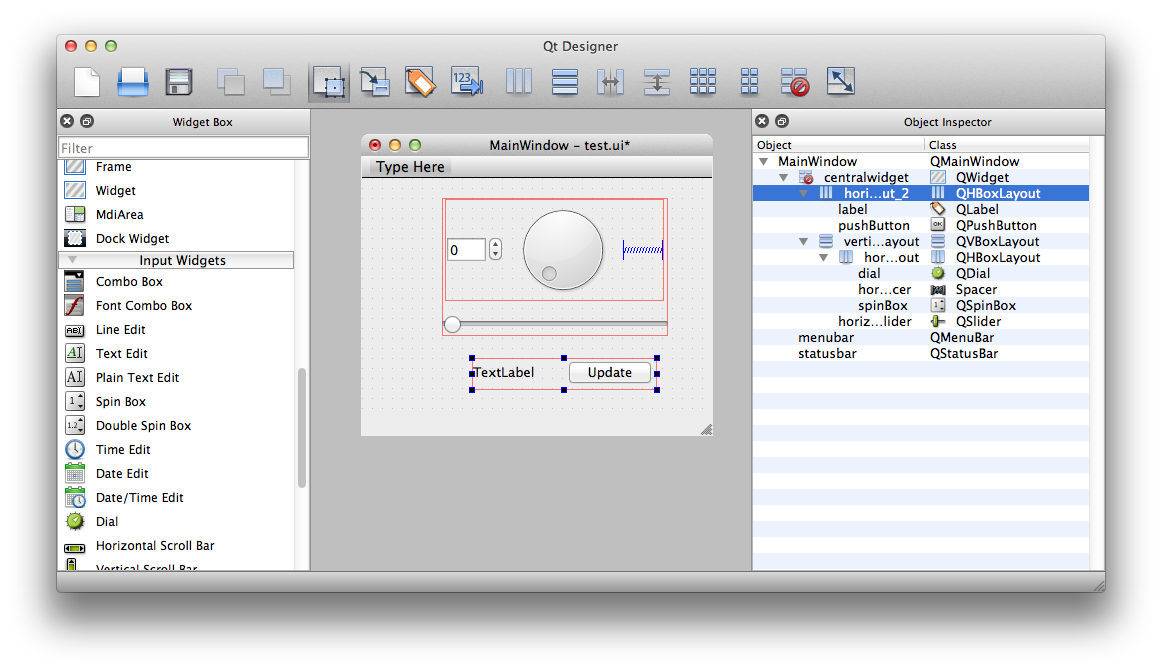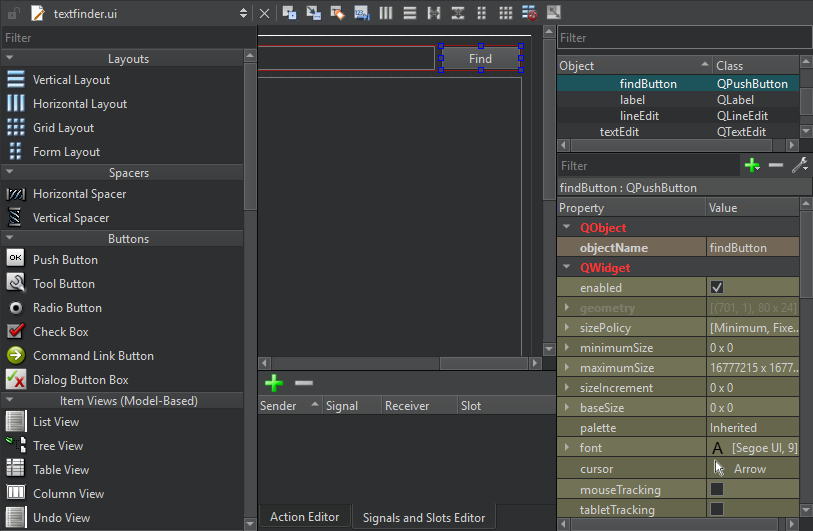Qt Designer Edit Signals Slots
Qt Designer provides an easy way to connect signals to slots. If you go to Edit Edit Signals/Slots (or press F4) you will be presented with a graphical overview of the currently assigned signals and slots. The connection mechanism uses a vector indexed by signals. But all the slots waste space in the vector and there are usually more slots than signals in an object. So from Qt 4.6, a new internal signal index which only includes the signal index is used. While developing with Qt, you only need to know about the absolute method index.
EnArBgDeElEsFaFiFrHiHuItJaKnKoMsNlPlPtRuSqThTrUkZh
This page was used to describe the new signal and slot syntax during its development. The feature is now released with Qt 5.
Widgets and forms created with Qt Designerintegrate seamlessly with programmed code, using Qt's signals and slots mechanism, so that you can easily assign behavior to graphical elements. All properties set in Qt Designercan be changed dynamically within the code. 두 번째 예제 - 버튼을 클릭하면 내용이 바뀌는 프로그램 (Signal and Slot) 예제 작성 과정 #1 - Qt Designer를 이용하여 폼 제작 후, 시그널 슬롯 연결하기 예제 작성 과정 #2 - 소스 코드에서 시그널 및 슬롯 연결.
- Differences between String-Based and Functor-Based Connections (Official documentation)
- Introduction (Woboq blog)
- Implementation Details (Woboq blog)
Note: This is in addition to the old string-based syntax which remains valid.
- 1Connecting in Qt 5
- 2Disconnecting in Qt 5
- 4Error reporting
- 5Open questions
Connecting in Qt 5
There are several ways to connect a signal in Qt 5.
Old syntax
Qt 5 continues to support the old string-based syntax for connecting signals and slots defined in a QObject or any class that inherits from QObject (including QWidget)
New: connecting to QObject member
Here's Qt 5's new way to connect two QObjects and pass non-string objects:
Pros
- Compile time check of the existence of the signals and slot, of the types, or if the Q_OBJECT is missing.
- Argument can be by typedefs or with different namespace specifier, and it works.
- Possibility to automatically cast the types if there is implicit conversion (e.g. from QString to QVariant)
- It is possible to connect to any member function of QObject, not only slots.
Cons
- More complicated syntax? (you need to specify the type of your object)
- Very complicated syntax in cases of overloads? (see below)
- Default arguments in slot is not supported anymore.
New: connecting to simple function
The new syntax can even connect to functions, not just QObjects:
Pros
- Can be used with std::bind:
- Can be used with C++11 lambda expressions:
Cons
- There is no automatic disconnection when the 'receiver' is destroyed because it's a functor with no QObject. However, since 5.2 there is an overload which adds a 'context object'. When that object is destroyed, the connection is broken (the context is also used for the thread affinity: the lambda will be called in the thread of the event loop of the object used as context).
Disconnecting in Qt 5
As you might expect, there are some changes in how connections can be terminated in Qt 5, too.
Old way
You can disconnect in the old way (using SIGNAL, SLOT) but only if
- You connected using the old way, or
- If you want to disconnect all the slots from a given signal using wild card character
Symetric to the function pointer one
Only works if you connected with the symmetric call, with function pointers (Or you can also use 0 for wild card)In particular, does not work with static function, functors or lambda functions.
New way using QMetaObject::Connection
Works in all cases, including lambda functions or functors.
Asynchronous made easier
With C++11 it is possible to keep the code inline
Here's a QDialog without re-entering the eventloop, and keeping the code where it belongs:
Another example using QHttpServer : http://pastebin.com/pfbTMqUm
Error reporting
Tested with GCC.
Fortunately, IDEs like Qt Creator simplifies the function naming
Missing Q_OBJECT in class definition
Type mismatch
Open questions
Default arguments in slot
If you have code like this:
The old method allows you to connect that slot to a signal that does not have arguments.But I cannot know with template code if a function has default arguments or not.So this feature is disabled.
There was an implementation that falls back to the old method if there are more arguments in the slot than in the signal.This however is quite inconsistent, since the old method does not perform type-checking or type conversion. It was removed from the patch that has been merged.
Overload
As you might see in the example above, connecting to QAbstractSocket::error is not really beautiful since error has an overload, and taking the address of an overloaded function requires explicit casting, e.g. a connection that previously was made as follows:
connect(mySpinBox, SIGNAL(valueChanged(int)), mySlider, SLOT(setValue(int));
cannot be simply converted to:
...because QSpinBox has two signals named valueChanged() with different arguments. Instead, the new code needs to be:
Unfortunately, using an explicit cast here allows several types of errors to slip past the compiler. Adding a temporary variable assignment preserves these compile-time checks:
Some macro could help (with C++11 or typeof extensions). A template based solution was introduced in Qt 5.7: qOverload

The best thing is probably to recommend not to overload signals or slots …
… but we have been adding overloads in past minor releases of Qt because taking the address of a function was not a use case we support. But now this would be impossible without breaking the source compatibility.
Disconnect
Should QMetaObject::Connection have a disconnect() function?
The other problem is that there is no automatic disconnection for some object in the closure if we use the syntax that takes a closure.One could add a list of objects in the disconnection, or a new function like QMetaObject::Connection::require

Callbacks
Function such as QHostInfo::lookupHost or QTimer::singleShot or QFileDialog::open take a QObject receiver and char* slot.This does not work for the new method.If one wants to do callback C++ way, one should use std::functionBut we cannot use STL types in our ABI, so a QFunction should be done to copy std::function.In any case, this is irrelevant for QObject connections.
Signals and slots is a language construct introduced also in Qt[1] for communication between objects which makes it easy to implement the observer pattern while avoiding boilerplate code. The concept is that GUI widgets can send signals containing event information which can be received by other widgets / controls using special functions known as slots. This is similar to C/C++ function pointers, but signal/slot system ensures the type-correctness of callback arguments.[citation needed]
The signal/slot system fits well with the way graphical user interfaces are designed.[citation needed] Similarly, the signal/slot system can be used for other non-GUI usages, for example asynchronous I/O (including sockets, pipes, serial devices, etc.) event notification or to associate timeout events with appropriate object instances and methods or functions. It is easy to use and no registration/deregistration/invocation code need to be written, because Qt's metaobject compiler (MOC) automatically generates the needed infrastructure.

A commonly used metaphor[according to whom?] is a spreadsheet. A spreadsheet has cells that observe the source cell(s). When the source cell is changed, the dependent cells are updated from the event.
Alternative implementations[edit]
There are some implementations of signal/slot systems based on C++ templates, which don't require the extra metaobject compiler, as used by Qt, such as libsigc++, sigslot, vdk-signals, nano-signal-slot, neosigslot, Signals, boost.signals2, Synapse, Cpp::Events, Platinum and JBroadcaster. Common Language Infrastructure (CLI) languages such as C# also supports a similar construct although with a different terminology and syntax: events play the role of signals, and delegates are the slots. Another implementation of signals exists for ActionScript 3.0, inspired by C# events and signals/slots in Qt. Additionally, a delegate can be a local variable, much like a function pointer, while a slot in Qt must be a class member declared as such. The C based GObject system also provides similar functionality via GSignal.In D it is implemented by std.signals.
See also[edit]
Libraries[edit]
Java: sig4j - multi-threaded, type-safe, based on the FunctionalInterface annotation introduced in Java 8.
C++: vdk-signals - thread-safe, type-safe, written in C++11 with atomic variables.
References[edit]
Qt Designer Edit Signals Slots Tool
- ^'Signals & Slots - QtCore 5.1'. Qt Project. 2013-07-04. Retrieved 2013-07-04.